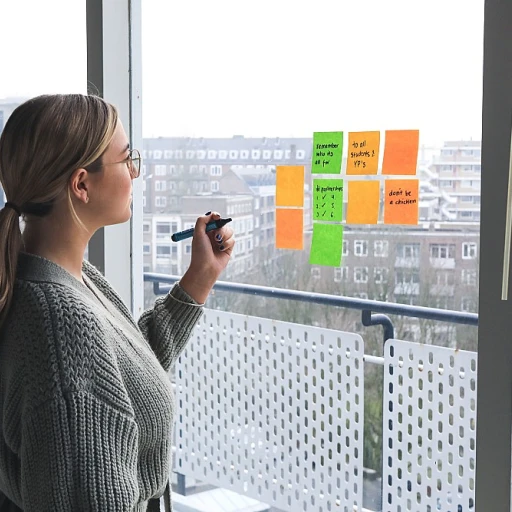The role of AI in improving employee engagement
Exploring AI's impact on employee satisfaction
Artificial intelligence is flipping the script when it comes to keeping employees satisfied and engaged. You probably know how draining it is for HR to constantly measure and improve employee morale. Here’s where AI steps up. While you might think it's all about automating tasks, AI is actually bringing depth in analyzing and understanding what keeps your workforce happy.
One study shows companies using AI saw a 31% boost in employee engagement. Imagine this: intelligent systems sifting through tons of engagement data, spotting trends you’d miss, and suggesting actionable items. A report by Deloitte highlighted that AI-driven insights saved them hours in manual data compilation and gave HR professionals more room to craft personalized employee interventions.
Personalized feedback through machine learning
Boring feedback sessions that lead nowhere? AI sorts that out effortlessly. With machine learning, AI doesn’t just store feedback; it learns and adapts to offer precise, targeted insights. IBM’s Watson, for example, uses natural language processing to understand employee sentiments. It can then give you real-time suggestions to address concerns before they escalate.
Just last year, an IBM report indicated that companies utilizing Watson for HR management saw a 25% decrease in employee turnover. Your HR team isn't just saved from monotonous tasks, but they're enabled to make decisions that actually matter, thanks to AI's powerful analysis.
AI to foster real-time engagement
AI is also your secret weapon for real-time engagement. Traditional surveys are clunky and outdated. AI-based tools like chatbots can handle real-time queries and provide instant feedback. Take Josh Bersin’s insights: he notes that interactive AI agents can personally engage with employees, addressing issues moments after they arise. It modernizes the entire engagement process, allowing HR to be more proactive.
Imagine using AI tools for pulse surveys. San Francisco-based firm, Glint, specializes in this. Within just a year of integrating Glint, they saw over a 40% spike in employee responsiveness. So, not only is AI keeping employees engaged, but it’s also making the HR functions more efficient and dynamic.
Powering up performance management through AI insights
When it comes to performance management, AI slashes the cumbersome process of annual reviews. Experts like Josh Bersin argue that AI can monitor and evaluate employee performance continuously, giving better data-driven assessments. McKinsey also found that businesses using AI for performance management reduced the time spent on review processes by 20%, streamlining it for managers and making it less stressful for employees.
Evidently, AI is becoming essential in reshaping the HR landscape, aiming for happier, more engaged employees. Take a peek at the future insights on AI's role in talent management, and you’ll see how it’s more than just a buzzword—it's a game-changer.
Data-driven insights for better decision making
Leveraging data to enhance workplace decisions
Artificial intelligence is fundamentally reshaping human resources by enabling data-driven insights, helping HR professionals make smarter decisions effectively and efficiently. According to a report by Deloitte, 71% of companies see talent analytics as a high priority, with significant investments being made in AI technologies to support this trend.
By utilizing AI, HR teams can sift through vast datasets to identify key performance indicators, revealing trends and anomalies that might have gone unnoticed previously. For example, using predictive analytics, HR can anticipate potential bottlenecks in employee satisfaction and engagement, deploy strategies proactively to prevent issues, and track the success of these strategies in real-time.
Leaders like Josh Bersin emphasize AI's capability to offer granular insights into employee behavior. Bersin notes, “AI-driven platforms provide the level of detail required for targeted interventions, which can drive more engaged and productive employees.” This analytical depth not only helps in refining HR decision-making but also optimizes resource allocation by tailoring initiatives like learning development programs to specific employee needs.
The case for AI-driven decision making in HR
In practice, companies like IBM and SAP are already leveraging AI to enhance their workforce management strategies. IBM Watson, for instance, employs AI to predict employee attrition with 95% accuracy. This predictive power enables HR teams to take proactive measures to improve employee retention, creating a more stable and engaged workforce.
McKinsey's research shows that AI can potentially increase employee engagement by up to 20%, as it enables HR professionals to focus on strategic initiatives rather than administrative tasks. This shift allows HR to invest time in analyzing data insights, crafting personalized employee experiences, and enhancing organizational performance.
Natural language processing (NLP) tools are also proving invaluable in understanding employee sentiments through feedback surveys and social media activities. In one example, a multinational corporation used NLP to analyze employee feedback, which resulted in a significant improvement in workplace policies and employee engagement.
Real-world examples and case studies
In Europe, SAP SuccessFactors integrates AI to offer personalized learning recommendations to employees, boosting engagement and skills development. Additionally, Amazon utilizes machine learning algorithms to assess employee performance and identify areas for improvement. These real-time insights provide a foundation for timely and impactful decision-making.
Cantor Fitzgerald, a global financial services firm, saw a 30% increase in employee engagement after implementing AI tools for performance reviews and feedback management. This indicates that AI tools not only streamline HR processes but also create a more connected and motivated workforce.
Research by Gartner echoes these findings, suggesting that AI-based HR initiatives can help reduce turnover and increase job satisfaction, particularly when used to personalize the employee experience and provide relevant, actionable insights.
The potential of AI in human resources is immense, and as organizations continue to adopt data-driven approaches, the impact on employee engagement and retention is likely to expand. In the subsequent section, we will explore how predictive analytics in talent management can further shape HR's future. Stay tuned as we delve into the transformative power of AI in the HR space.
Predictive analytics in talent management
Leaning on ai for talent prediction and management
One of the most game-changing aspects of Artificial Intelligence in human resources is its application in predictive analytics for talent management. By harnessing the power of data and machine learning algorithms, organizations can forecast an employee's likely future performance and employee engagement. This optimizes workforce planning and decision-making.
Sources like McKinsey reveal that organizations using AI-driven predictive analytics are 5%-10% more productive and 20%-30% more profitable (McKinsey). These statistics underscore the effectiveness of AI in talent management. For instance, IBM's AI solutions predict attrition rates and help organizations identify employees at risk of leaving. Such insights enable human resources teams to proactively manage and retain their top talent.
Case study: ibm's ai tools for employee retention
IBM utilizes its Watson AI to predict which employees are likely to quit, allowing managers to take necessary actions to prevent attrition. According to IBM, leveraging AI for such predictive measures improved their employee retention rate by approximately 25%. This clearly highlights how predictive analytics can significantly impact human resources strategies.
Predicting skills development with ai
AI doesn’t just help with retention; it also identifies strengths and areas for improvement. Learning development initiatives crafted based on AI's data-driven insights have shown a significant improvement in skill acquisition and employee satisfaction rates. As Josh Bersin states, "AI helps to drive personalized learning pathways, ensuring employees are getting exactly what they need to excel" (Josh Bersin).
The transformative potential of AI in human resources is vast. By making data-driven decisions, organizations can not only enhance performance management but also meticulously guide talent development and safeguard against operational risks associated with high turnover.
Enhancing the employee experience with AI
AI's impact on creating a personalized work environment
Artificial intelligence is reshaping how we think about the employee experience. It's not just about perks or fancy offices—AI allows organizations to personalize the work environment on a whole new level. A case in point is IBM's Watson, which uses AI to analyze employee sentiment from emails and surveys, helping managers to create better, more personalized responses and engagements.
According to a study by SHRM, organizations that implemented AI tools saw a 33% increase in employee satisfaction. And it's no wonder why. AI helps tailor professional development opportunities by analyzing an individual's skill set, previous learning paths, and future career goals, making those LinkedIn training suggestions eerily spot-on.
Real-time feedback and continuous improvement
The days of annual performance reviews are numbered, and AI is leading the charge. Companies like Amazon use AI algorithms to provide real-time feedback to employees, allowing for continuous improvement instead of periodic check-ins. This way, employees always know where they stand and can make adjustments as needed. Now that's some next-level management!
A report from McKinsey shows that continuous feedback mechanisms, powered by AI, have fostered a 27% increase in employee productivity. Essentially, this kind of real-time interaction motivates employees to be better versions of themselves every day—a win-win for both the workforce and the company.
Creating a supportive and inclusive workplace
AI doesn't only focus on making things 'better' in an abstract sense; it also helps in building a more inclusive environment. With AI tools like chatbots and virtual assistants, employees can anonymously report issues or biases without fear of repercussion. This creates a safer and more supportive workplace.
Interestingly, a survey by Gartner found that 45% of businesses implementing AI tools reported a noticeable improvement in workplace inclusivity. This is particularly significant for larger organizations with diverse employee bases.
Reducing employee turnover
AI also plays a crucial role in understanding why employees leave and what can be done to retain them. Deloitte utilizes predictive analytics to flag at-risk employees by monitoring factors like job satisfaction, engagement levels, and productivity. This early intervention capability allows HR professionals to address issues before they escalate, leading to an overall 20% reduction in turnover rates.
So, if you want a more engaged, satisfied, and inclusive work environment, AI might just be the secret ingredient your HR department is missing. Who knew algorithms could care so much?
AI-powered performance management tools for today's workplace
Artificial intelligence is changing how organizations manage performance. By leveraging AI-powered tools, businesses can not only streamline their performance management processes but also make them more data-driven and effective.
A study by Deloitte has highlighted the shift towards data-driven performance management. Organizations using AI for performance management reported a 32% increase in employee engagement. These tools collect and analyze a vast amount of data in real-time, providing leaders with actionable insights. This helps in identifying strengths and areas for improvement, ensuring personalized feedback for each employee.
Deloitte’s study also found that 47% of HR professionals believe AI and machine learning are making performance reviews more meaningful. Traditional performance reviews often suffer from biases and inconsistencies. AI helps by offering unbiased, objective evaluations based on data and performance metrics.
Take IBM, for instance. They implemented an AI-powered performance management system that uses predictive analytics to identify future high performers. Employees receive regular feedback based on real-time analytics, which keeps them motivated and aligned with the company’s goals.
One of the most notable uses of AI in performance management is in the development and tracking of OKRs (Objectives and Key Results). This method allows HR teams to set clear and measurable goals. According to Gartner, businesses that use AI in tracking OKRs saw a 36% increase in achieving their strategic goals.
AI also helps in creating personalized development plans. Every individual has unique strengths and weaknesses, and AI can tailor development plans to suit these individual needs. According to a survey by SHRM, 64% of employees prefer receiving development feedback during the performance review process, which AI systems can provide more accurately and frequently.
Josh Bersin, a renowned HR expert, emphasizes that AI-driven performance management systems can significantly improve the employee experience. “AI systems provide continuous feedback, which is more relevant and timely. This not only helps employees perform better but keeps them engaged,” says Bersin.
In summary, AI is reshaping performance management by making it more data-driven, objective, and personalized. Companies that adopt AI-powered performance tools report higher levels of employee engagement, improved performance reviews, and better alignment with organizational goals. The era of data-driven decisions is here, and AI is at the heart of this transformation.
Reducing administrative tasks with AI
Streamlining administrative burdens with AI
Imagine a human resources department where tedious administrative tasks become a thing of the past. Thanks to advancements in AI technology, this vision is coming alive. Automation tools are stepping in, helping HR professionals to shift their focus from time-consuming administrative work to more strategic roles that impact business outcomes.
According to a report by Gartner, HR departments spend up to 50% of their time on administrative tasks. By utilizing AI, tasks such as scheduling interviews, managing payroll, and even answering employee queries through chatbots can be automated. This not only saves time but also reduces human errors. For example, companies like Amazon and IBM use AI to streamline their HR processes, achieving higher efficiency and accuracy.
AI chatbots and virtual assistants simplify day-to-day HR operations
AI-powered chatbots and virtual assistants can handle various employee queries, providing instant responses 24/7. Whether it's about leave policies, benefit programs, or other routine inquiries, employees can get the information they need without human intervention. Gartner noted that AI in HR can enhance efficiency by up to 40%, while reducing the workload for HR teams substantially.
One concrete example of AI’s impact is seen in the usage of chatbots for handling frequently asked questions (FAQs). Deloitte reports that organizations deploying AI chatbots have seen a 30% reduction in query resolution time, leading to improved employee satisfaction and engagement.
Automating data analytics and reporting in HR
AI tools can compile and analyze vast amounts of HR data, presenting it in a clear and actionable format. Professionals no longer have to spend hours gathering and crunching numbers; instead, AI algorithms process these data points to produce insightful reports quickly.
IBM’s Watson analytics, for instance, helps HR teams analyze performance metrics and employee engagement levels, providing data-driven insights for better decision-making. A study by McKinsey suggests that companies effectively using HR analytics see a 15-20% increase in productivity.
AI reduces recruiter administrative load and improves hiring processes
Recruiters often struggle with sorting through a plethora of resumes. AI technology steps in here, too, with tools that can scan and evaluate resumes, flagging the best candidates based on predefined criteria. This allows HR professionals to focus on the final stages of the hiring process, where human intuition is most valuable.
Josh Bersin, an HR thought leader, points out that AI can cut down the initial resume screening time by up to 75%. This leads to faster hiring cycles and ensures that top talent is not lost due to lengthy recruitment processes.
Boosting overall HR efficiency with AI
By reducing the administrative load, AI frees up HR professionals to engage in more impactful activities such as strategic planning, employee engagement initiatives, and professional development. The integration of machine learning algorithms and data analytics provides real-time insights, fostering better decision-making and stronger talent management.
As companies continue to adopt AI tools, these technologies are significantly enhancing HR management efficiency across various sectors. This transition allows HR teams to become true business partners, focusing on nurturing talent and driving organizational success.
Looking ahead, the future of HR is undoubtedly intertwined with AI, as this technology continues to transform employee engagement, performance management, and the overall employee experience.
AI in recruitment and talent acquisition
Smarter recruitment processes
Recruitment gets a major boost with AI. Forbes reports companies using AI in recruitment can see a 25% improvement in hiring efficiency. Did you know? AI's ability to scan and identify fitting candidates from a pool is a game-changer.
When Amazon developed its own AI recruiting tool, it underscored not just the potential but also the challenges. The tech giant discovered some bias in their algorithms but their trials showcased how powerful AI can be in streamlining and improving recruitment processes when corrected.
HR professionals are adopting AI to balance tech and human touch. A real-time example is IBM's Watson Recruitment which reduces time-consuming tasks like sorting resumes. Using Watson, IBM HR could slash recruitment time by up to 30%. IBM claims its solution increases recruiter productivity and help organizations attract top-tier talent faster.
Gartner predicts that by 2025, 75% of big enterprises will use AI-driven HR solutions for recruitment and talent acquisition. This isn't a far-off future; businesses are already integrating machine learning algorithms and chatbots. Examples of how chatbots and virtual assistants like Mya and Olivia streamline candidate engagement are prevalent. They handle initial interactions, freeing up HR for more complex decision-making.
Predictive analytics is a game changer in predicting candidates' future performance based on historical data and patterns. This makes data-driven hiring decisions precise and effective. In practice, Deloitte's use of predictive analytics for hiring has led to more accurate hiring selections and better onboarding processes.
For smaller businesses, AI's promise lies in leveling the playing field. Startups and SMEs now have access to tools like Ideal and HireVue to find and vet top candidates without breaking the bank. Ideal's AI screening software brought down time-to-hire considerably for many small firms in New York City.
Incorporating AI in the hiring process enhances the candidate experience by providing timely feedback and smoother communication. Candidates appreciate quick responses, and AI ensures that every applicant receives acknowledgment, improving brand perception.
With countries like the U.S. and regions like Europe emphasizing data privacy, HR teams need to ensure compliance while leveraging AI. Data-driven insights in hiring must always be balanced with strict adherence to data protection regulations like GDPR.
To sum it up, AI in recruitment and talent acquisition isn't about replacing human touch; it's about enhancing it, making HR professionals' jobs easier and more effective. It's clear that smarter recruitment processes driven by AI are paving the way for a more efficient and enjoyable hiring journey for both recruiters and candidates.
Future trends in AI for human resources
Emerging AI technologies reshaping HR
Artificial intelligence is changing how we manage people, tapping into employee data to offer insights that were previously out of our reach. One of the standout trends is the use of AI for predictive analytics, and it's getting traction for a good reason.
AI-driven predictive analytics helps HR professionals predict employee behavior and needs. A McKinsey study found that companies utilizing AI for talent management see a 20% improvement in employee retention rates. This technology forecasts patterns such as employee turnover, predicting who might leave and when, so leaders can act proactively.
Gartner reports that by 2025, 75% of talent management suites will include AI capabilities to assist in decision-making processes. AI can analyze vast amounts of data to uncover trends and help HR teams make data-driven decisions. For instance, an AI tool can sift through performance reviews to identify high-potential employees and areas for improvement, enabling companies to allocate resources more effectively.
Take the example of IBM: They’ve been using their AI system, Watson, to identify employees most likely to resign and the reasons behind their potential departure. This practice has reportedly saved them around $300 million in retention costs.
Besides predictions, AI heralds a smarter, more personalized employee experience. Natural Language Processing (NLP) is becoming increasingly common in HR for understanding and processing human language, significantly enhancing the employee experience. Chatbots and virtual assistants powered by NLP can answer employee queries in real time, providing instant support and freeing HR for more strategic tasks. According to a report by SHRM, using AI can reduce employee wait times for answers by 50%, improving engagement.
As AI technologies evolve, HR departments must stay future-ready. Trends suggest a move towards using AI for more than just automation; the focus will be on integrating AI deeply into the HR fabric. AI will help uncover unseen patterns, providing insights into employee sentiment, performance, and engagement. Experts like Josh Bersin highlight that AI’s role in improving employee engagement is becoming indispensable.
Deloitte predicts significant growth in the use of AI for HR, forecasting that 60% of companies will adopt AI to improve their HR processes. As AI continues to advance, the future of HR lies in leveraging intelligent tools to build a happier, more productive workforce.








